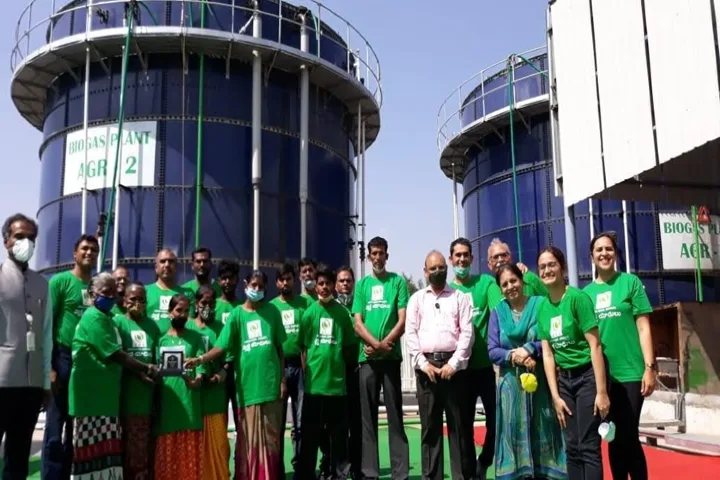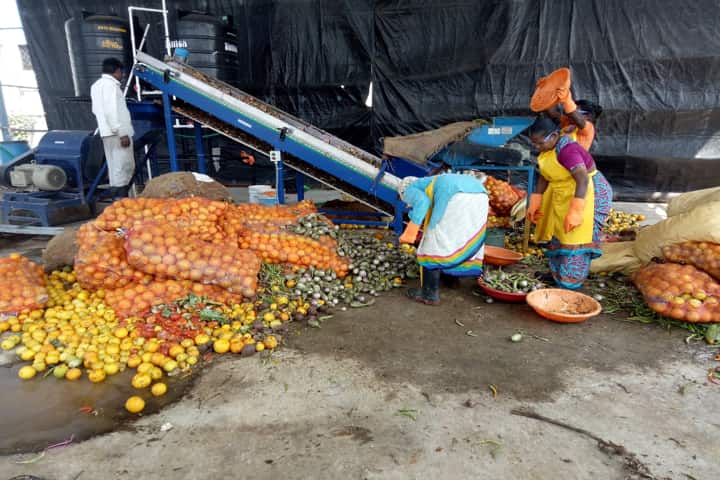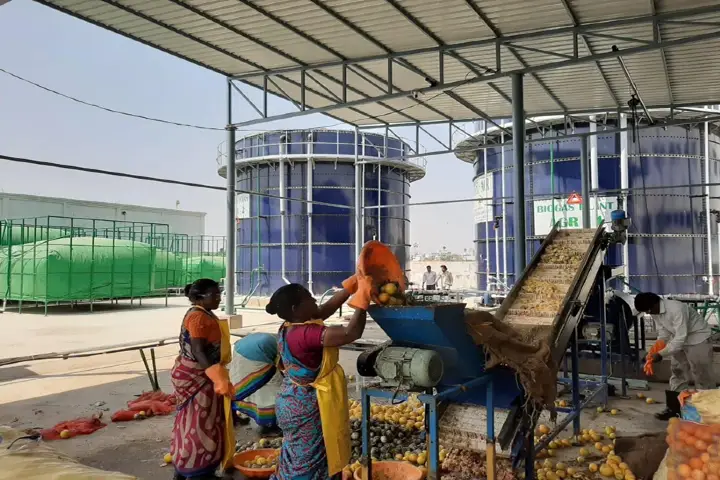The Bowenpally vegetable market yard, the biggest among the eight operated by the Department of Agriculture Marketing of Telangana is making news for the right reasons. It now boasts of a sustainable waste-to-energy plant based on anaerobic (which means absence of air) technology that takes care of the eight to 12 tonnes of vegetable and fruit waste generated here.
Agricultural Produce Market Committee market yards enable farmers to sell their produce to wholesale and retail sellers. These yards generate a lot of waste which is collected by local civic bodies or collection agencies and taken to landfills entailing labour and transportation cost; emission of greenhouse gases; and reduction of already limited landfill space.
A sustainable solution to address these concerns while helping APMCs to save time and money is to process the waste produced onsite in the market yard through waste-to-biogas plants. This method does away with the need to have storage facilities for the waste and prevents its decay which causes foul smell and breeding of pests.

The technology for this sustainable and remunerative plant was developed by the Council of Scientific & Industrial Research-Indian Institute of Chemical Technology, Hyderabad while the Department of Biotechnology, Ministry of Science and Technology, Government of India funded it and M/s. Ahuja Engineering Services Private Limited, Secunderabad acted as the project executor.
DAM in Telangana State was keen on adopting the AGR technology in Bowenpally. The waste from this market was sent to the Jawahar Nagar landfill operated by Greater Hyderabad Municipal Corporation and about Rs.40 lakhs was spent per year for its disposal.
CSIR-IICT along with AESPL took up the installation and commissioning of the biogas plant with a capacity to treat 10 tonnes per day of waste. The responsibility for the required civil works and operation of the plant in future was accepted by DAM.

“The biogas plant was built using state-of-the-art technology and engineering aimed at providing clean, odour-free operation that efficiently converted waste into energy. It eliminated all the issues observed in conventional biogas plants (slow rate digesters) and employed robust technology and engineering design aimed to have low Capex and Opex costs,” Sandeep Karajanagi, Director of Ahuja Engineering told India Narrative.
Handling up to 10 tonnes of mixed vegetable waste, the plant generates 350- 400 cubic metres per day of biogas. This is able to generate 250 units of electricity a day and additionally replaces or saves 30 to 40 kg of LPG in the market yard canteen.
Bowenpally market yard saves Rs. 3 lakhs towards power bills, Rs. 2 lakhs for the disposal of waste every month, in addition to LPG savings in the kitchen. Additionally, the plant at present is employing eight people who operate the plant.
Telangana Generates Electricity from Vegetable Waste
Prime Minister @narendramodi praises Hyderabad’s Bowenpally Vegetable Market’s innovative efforts at ‘Man Ki Baat’
Read here: https://t.co/xKfb81yccj @MoHUA_India pic.twitter.com/SEAC2tay3J
— PIB India (@PIB_India) April 9, 2023
The leftover biogas slurry can be used as bio-fertiliser and soil conditioner or used to make solid and/or liquid bio-manure that can be used in gardens and urban greening projects. The Bowenpally yard sells this to a local entrepreneur.
The plant enables the yard to comply with Government’s rules; adhere to Swachh Bharat Mission’s objectives; eliminate cost of transporting waste to landfill; make the yard odour-free; and save money and fossil fuel by using biogas for electricity generation and cooking.
Sharing with India Narrative details about future innovations, Karajanagi, said: “While conversion of biogas to electricity is suitable for a market yard of this size, in future it could involve upgrading the biogas to bio-CNG (or CBG). A Bio-CNG bunker could be constructed which would fuel the vehicles that are transporting vegetable produce to and from the market every day. This would provide even greater savings for the market yard as it would save petrol/diesel costs and thereby reduce fossil fuel usage. Alternatively, the bio-CNG can be connected to the city gas distribution network.”




















